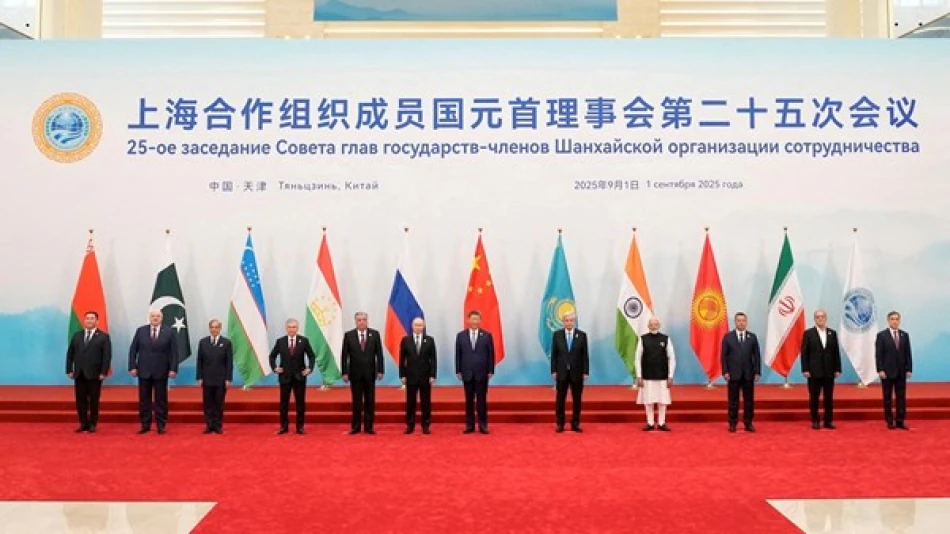
Chinese President Calls for a Just, Global Order
China's Xi Jinping Challenges Western Order as SCO Summit Convenes Amid Global Tensions
Chinese President Xi Jinping called for a new "justice-based" global order at the Shanghai Cooperation Organization summit in Tianjin, as the Eurasian bloc representing nearly half the world's population positions itself as an alternative to Western-led institutions. The gathering comes at a time when geopolitical fractures are deepening, with Russia's Putin using the platform to justify the Ukraine conflict while blaming Western policies for global instability.
The SCO's Growing Influence in a Multipolar World
The Shanghai Cooperation Organization has evolved from a regional security forum into a significant geopolitical counterweight to Western alliances. With ten member states including China, Russia, India, Pakistan, and Iran, plus 16 observer and partner nations, the bloc now represents 23.5% of global GDP and nearly half of humanity's population.
This demographic and economic heft gives the SCO considerable leverage in challenging the post-World War II international order dominated by institutions like NATO, the G7, and the UN Security Council. Xi's call to "enhance the historical perspective of World War II and oppose Cold War mentality, bloc confrontation, and intimidation policies" directly targets what Beijing sees as Western hegemony.
Economic Implications for Global Markets
The SCO's emphasis on alternative governance structures has profound implications for international trade and investment flows. As Western sanctions on Russia and growing tensions with China reshape global commerce, the organization offers member states potential pathways around dollar-dominated financial systems.
For investors, the SCO represents both opportunity and risk. The bloc's combined market size rivals that of the European Union, but political tensions and varying regulatory environments create uncertainty. Energy markets are particularly affected, as Russia and Central Asian members control significant oil and gas reserves, while China dominates critical mineral supply chains.
Putin's Ukraine Narrative Finds Regional Audience
Russian President Vladimir Putin's framing of the Ukraine conflict as a Western-instigated crisis rather than Russian aggression reflects Moscow's strategy of maintaining support among non-Western nations. His claims that the conflict resulted from a "Western-backed coup" in Ukraine and NATO expansion attempts resonate with SCO members who view Western military alliances with suspicion.
This narrative diverges sharply from Western interpretations but aligns with the SCO's foundational principle of opposing external interference in member states' affairs. For Putin, the forum provides crucial diplomatic cover as Russia faces international isolation over its military actions.
Comparing Regional Blocs in an Era of Fragmentation
The SCO's assertiveness mirrors similar trends in other regional organizations challenging Western influence. ASEAN has pursued strategic autonomy between major powers, while the African Union increasingly questions Western intervention policies. Even traditional allies like Turkey have sought greater independence from NATO constraints.
Unlike the European Union's integration model based on shared democratic values and economic convergence, the SCO operates on principles of sovereignty and non-interference. This approach appeals to authoritarian governments but creates coordination challenges on complex global issues requiring unified action.
Strategic Implications for Global Governance
Xi's vision of a "justice-based" international order represents a fundamental challenge to liberal democratic norms that have shaped global governance since 1945. The SCO's alternative model prioritizes state sovereignty over human rights concerns and economic development over environmental standards in many cases.
This ideological competition will likely intensify as climate change, technological governance, and economic inequality require coordinated international responses. The SCO's ability to present viable alternatives to Western-led solutions could determine whether the current international system adapts or fragments into competing spheres of influence.
The Tianjin summit demonstrates that the era of unipolar Western dominance is giving way to more complex geopolitical arrangements. How effectively the SCO translates its demographic and economic weight into concrete policy alternatives will shape the next phase of international relations.
Most Viewed News

 Layla Al Mansoori
Layla Al Mansoori






